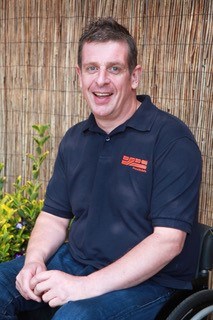A workplace accident 28 years ago left Jason Anker in a wheelchair, but he has not let his injury stop him from proclaiming a message of positivity across the world.
Anker was 24 years old, married with two children, and living in northeast England when he went to work one day in 1993. He and his team were completing their last tasks of the day when they rushed to finish early. This hasty approach saw Anker fall three metres (10 feet) off an unsecured ladder and injure his spine, paralyzing him from the waist down and forcing him into a wheelchair.
This greatly affected his life: his wife left him after he came home from the hospital, while his injury had a “massive impact” on his parents, friends, and colleagues.
“I didn’t cope. I wasn’t one of these people who was inspired to change. I went down a very dark route. I turned to alcohol and drugs. I had a really bad time … ,” said Anker, 53. “My story is very typical of what happens when things go wrong.”
Anker eventually turned around his life, but it took 14 years to do so.
“I’m doing really well today, especially the last (three) years,” he added. “I think it’s taken me about 25 years to really adjust properly. I’m really thriving at the moment.”
In 2010, Anker began speaking about his injury, its effects on him, and how he changed his life. Those talks took him to Europe, across the United Kingdom, throughout the United States, in the Middle East, and recently, in Saskatchewan.
Anker was one of four presenters to speak during the Workers’ Compensation Board’s 23rd annual Compensation Institute from May 25 to 26. The two-day virtual conference offered participants the chance to learn about the province’s compensation system and the latest safety, prevention and health initiatives in workplaces.
Anker kept his presentation positive and provided advice about how he turned his life around and addressed his mental health issues.
His main point was that, besides safety, workers also need to focus on their entire well-being since this can influence their choices. Workers need to spend quality time with family and friends, so they have the right frame of mind when they go to work.
“So, when that critical safety decision that is forced upon them, (they will be) in a good place — potentially, they will make the right choice,” he said.
During his talk, Anker compared the compensation programs in the United Kingdom and Canada. In the U.K., workers must prove that the company was at fault in their injury, while in Canada, the focus is less on blame and more on compensation.
It takes an average of five years for U.K. workers to receive compensation based upon the severity of the incident, Anker said. For him, it took 14 years due to the complexity of his case.
Injured workers in Canada typically receive regular small lump-sum payments as compensation, while in the United Kingdom, workers receive one large sum.
Having a large amount of money in the bank was not positive for Anker since he was struggling with his mental health. He pointed out that mental illness — he still suffers from anxiety and depression today — was not widely discussed decades ago.
While he was shown how to use his wheelchair and gym equipment, he was told nothing about managing his mental health or spending the rest of his life in a wheelchair.
“I’m quite thankful for the wheelchair today. Instead of looking at the wheelchair as something that took everything away from me, I’m actually looking at it in a positive frame of mind … ,” added Anker. “It’s taken me around the world; it’s probably taken me further than my legs ever would have done.”
Based on his efforts to promote workplace safety, in 2015, the U.K. government named Anker as a Member of the Most Excellent Order of the British Empire (MBE). This is the third-highest award that acknowledges contributions to public service.




